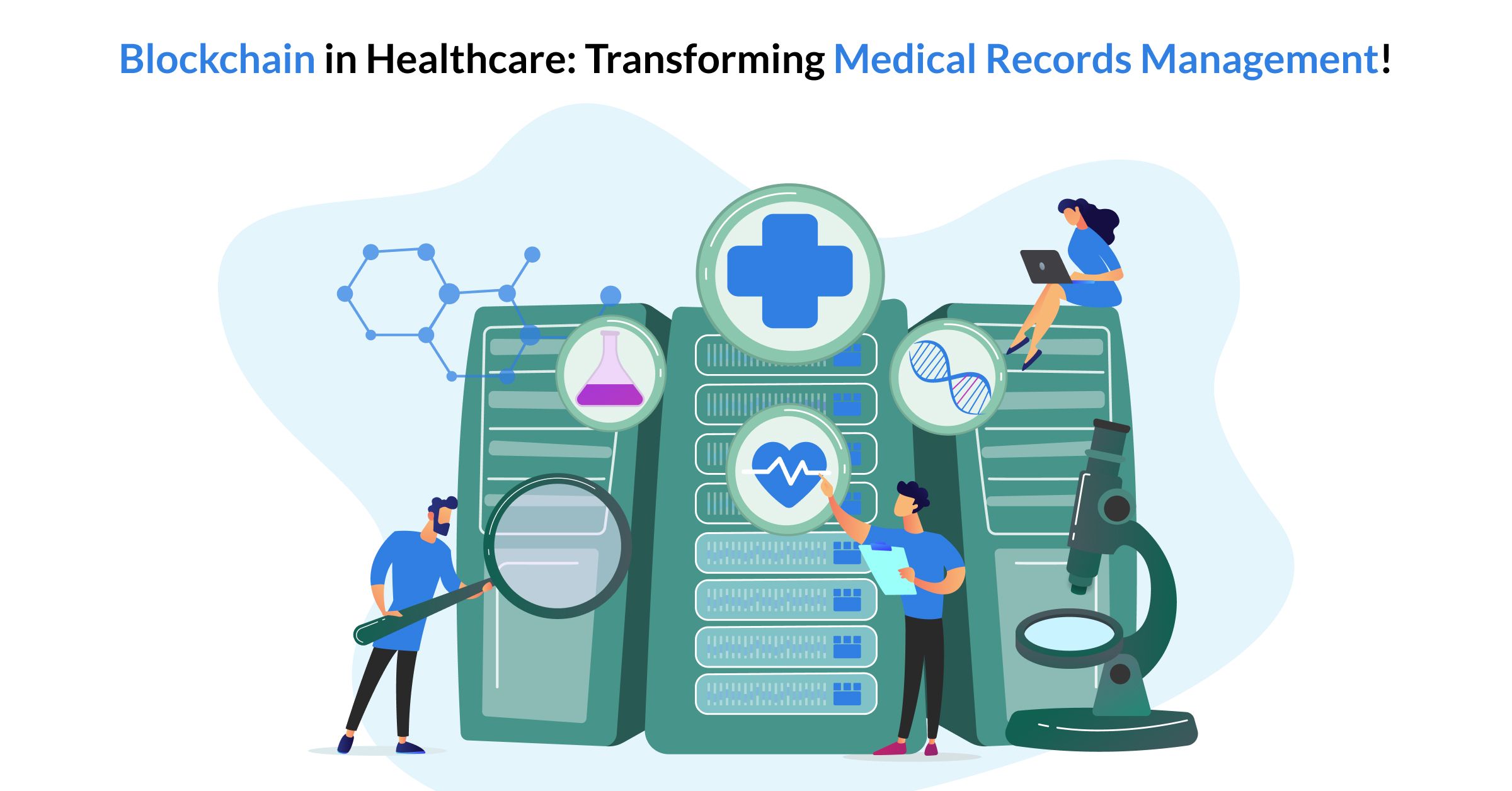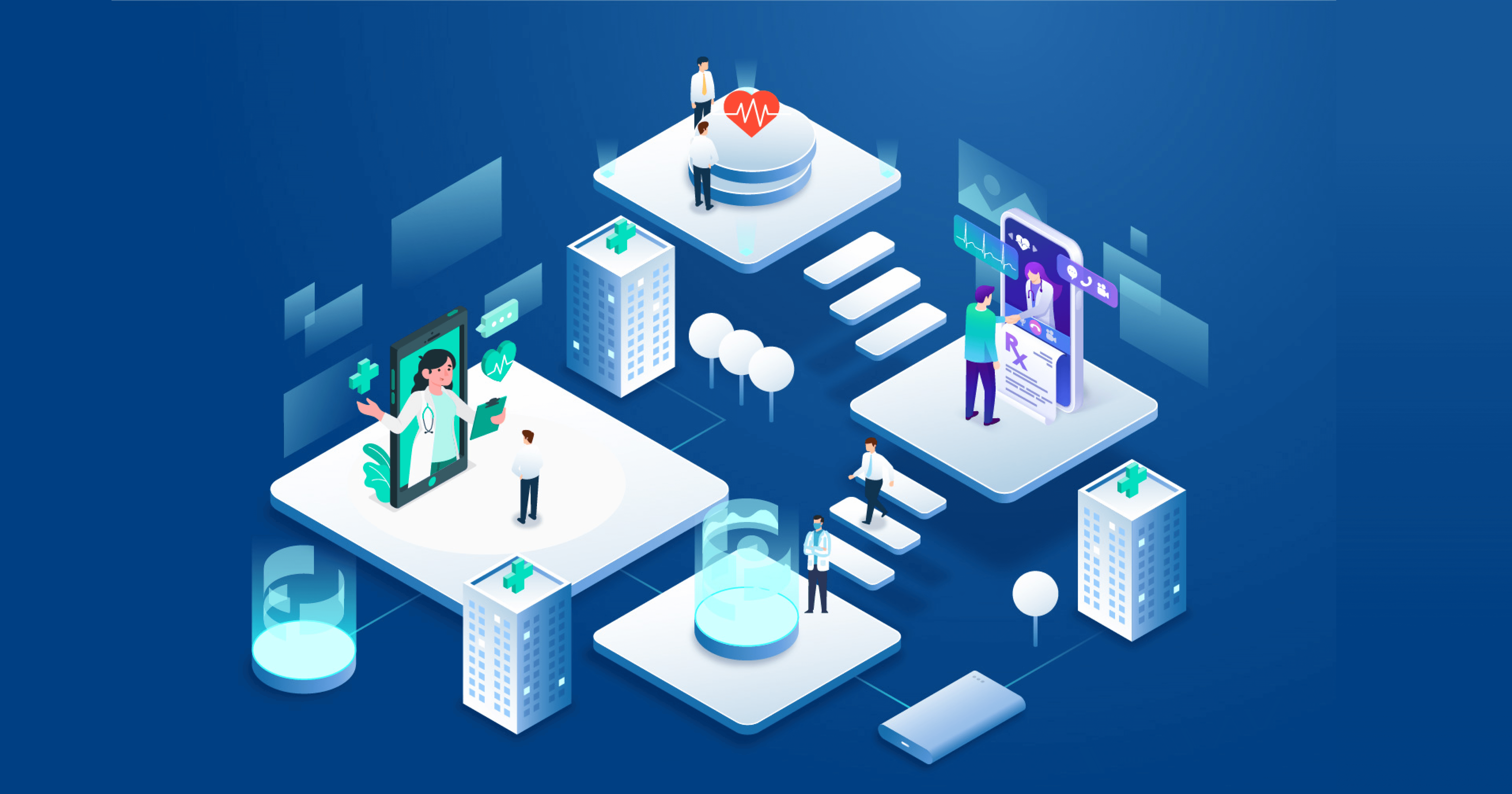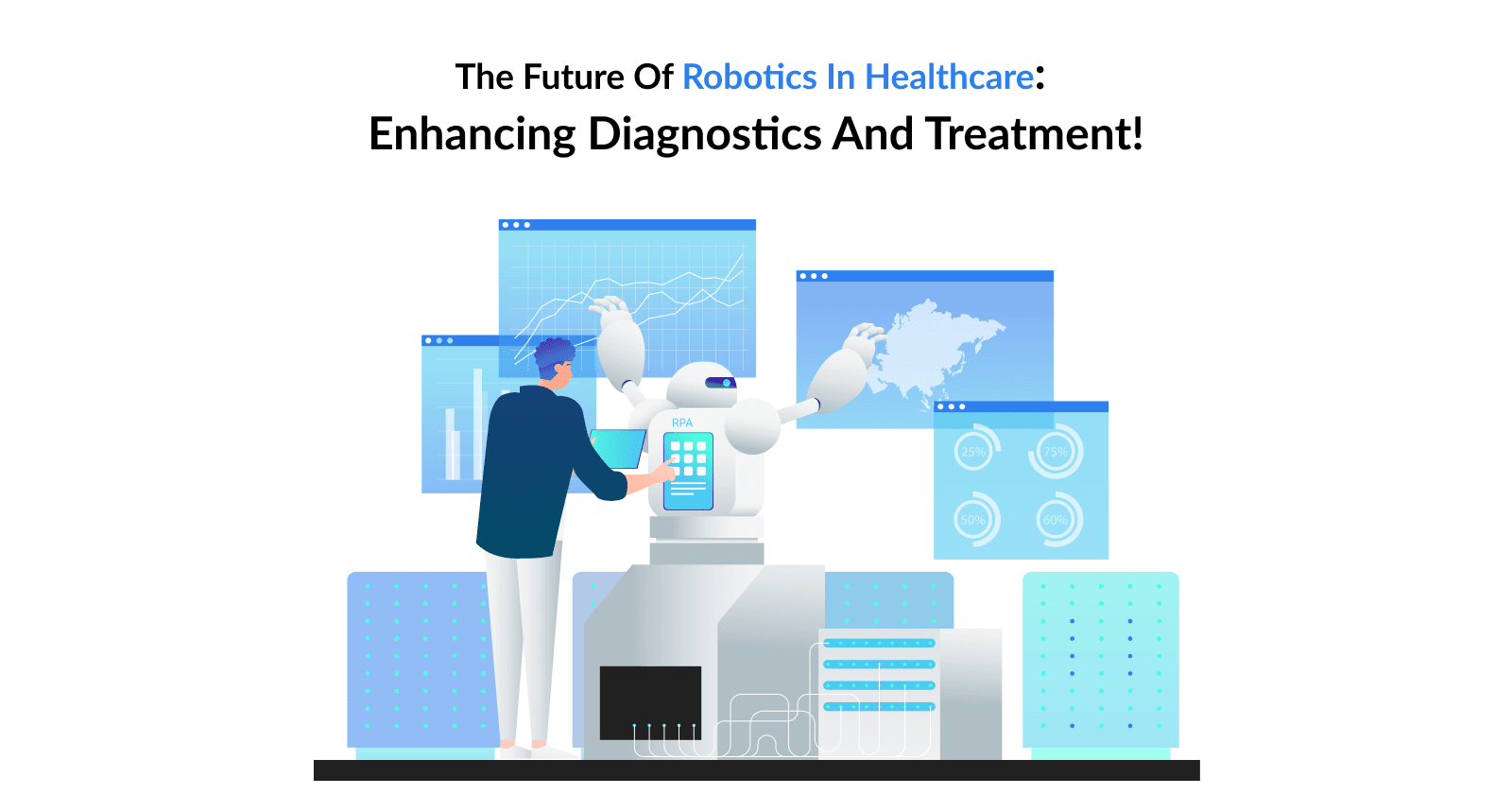Introduction
In the healthcare business, artificial intelligence (AI) is driving enormous improvement and innovation. It is facilitating medication research and development and enabling for better and faster diagnosis.
In the healthcare business, artificial intelligence (AI) is driving enormous improvement and innovation. It is facilitating medication research and development and enabling for better and faster diagnosis.
The Covid-19 epidemic has forced the healthcare industry to actively utilize this new technology.
When utilized in the following areas, AI in healthcare may be immensely advantageous to both doctors and patients: enhancing treatment, chronic illness management, early risk detection, and workflow automation and optimization.
In this blog, we will go through artificial intelligence in depth to give you an understanding of how the technology is employed in healthcare and how it will change the sector in the future.
Let's get started.
How Artificial Intelligence is Transforming the Healthcare Industry
AI has shown to be a benefit for the healthcare business, from generating accurate diagnoses to increasing hospital efficiency. Here are a few examples of how AI is transforming the healthcare business and driving it toward digital transformation to better engage people and make more income.
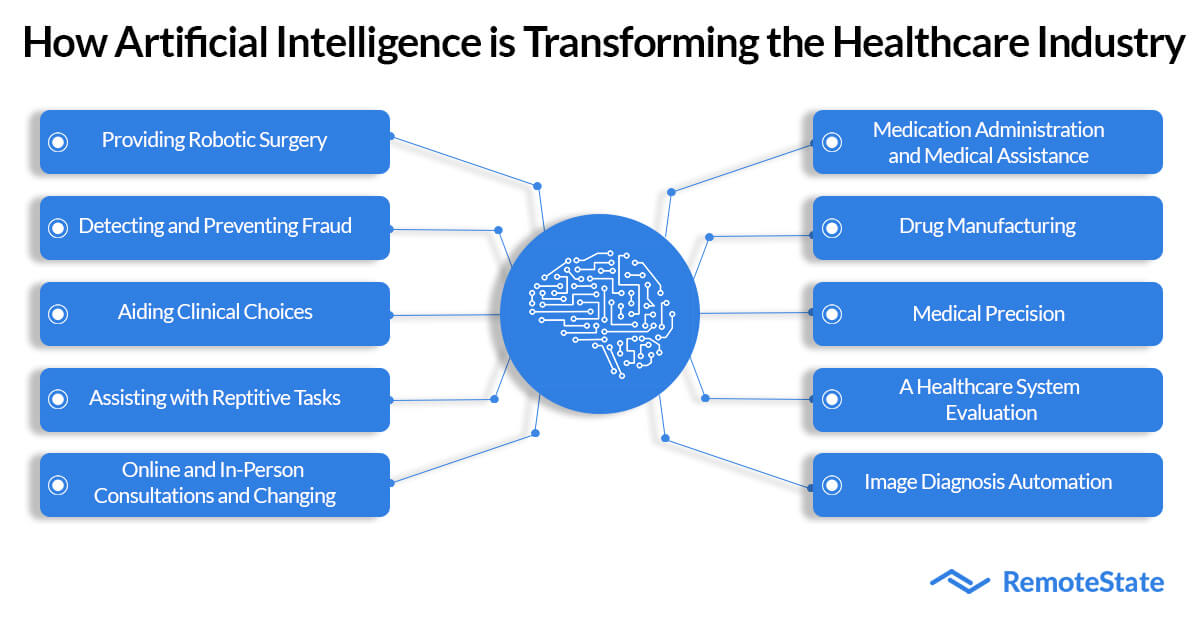
1. Providing robotic surgery
It is one of the most popular uses of artificial intelligence in healthcare. In terms of speed and precision, artificial intelligence and collaborating robots have transformed surgery. These technologies can carry out sophisticated surgical procedures with fewer chances of complications, blood loss, or pain. Similarly, post-surgery recuperation is quicker and smoother.
Maastricht University Medical Center, for example, has been using an AI-powered robot to suture small blood vessels, some no thicker than 0.03 millimeters. Professionals and surgeons that use AI in medicine and healthcare gain real-time information and insights into a patient's present health status. This AI-powered data helps healthcare practitioners to make quick, informed decisions before, during, and after treatments to ensure the best possible outcomes.
2. Detecting and preventing fraud
According to the US Justice Department, 3% of all healthcare claims in the country are false.
This amounts to a hundred billion dollars lost each year. The healthcare business may use AI to detect invalid claims before they are paid for and to speed up the processing, approval, and payment of genuine claims. Aside from detecting insurance fraud, AI also prevents patient data theft.
Leading healthcare providers, such as Harvard Pilgrim Health, are using artificial intelligence to combat healthcare fraud. To identify claims and detect questionable conduct, they use AI-based fraud detection tools.
3. Aiding clinical choices
Artificial intelligence is transforming the way clinical professionals make judgments in healthcare. AI provides data to healthcare practitioners to help with diagnosis, treatment planning, and population health management. The technology is also utilized to aid decision-making in data-intensive fields such as ophthalmology, radiography, and pathology.
Soon, AI may even be able to execute certain activities automatically.
AI, through natural language processing, can also assist in the translation of clinical notes in EHRs. This implies that a physician only has to submit information once.
4. Assisting with Repetitive Tasks
Healthcare is increasingly advancing into the realm of Cognitive Assistants, who are equipped with thinking, analytical ability, and a comprehensive variety of medical information. Medical Sieve, a recently developed algorithm, has been certified to aid with judgments relating to cardiology and radiology.
The cognitive health assistant analyzes radiological pictures to find and recognize abnormalities more quickly and reliably.
One of the instances of artificial intelligence in healthcare is Medical Sieve. Other technologies, such as Enlitic, attempt to combine deep learning with medical data to enable enhanced diagnosis and improve patient outcomes.
5. Online and in-person consultations are changing
The Babylon App is a functioning illustration of how artificial intelligence might alter medical consultations. The software provides online medical consultation and healthcare services. The app delivers medical AI advice based on a patient's medical history and medical understanding.
These AI-based apps function in such a manner that users simply have to report the symptoms of their condition, and the app then compares the signs to a database of diseases using speech recognition. Then, after taking into account the patient's history and circumstances, they recommend a plan of action that the patient should adopt.
Apps like these, when properly designed with the assistance of a healthcare software development business, not only help people manage their health but also help reduce waiting room crowding and wait time.
6. Medication Administration and Medical Assistance
Molly, the world's first digital nurse, was created by Sense.ly, a medical firm. The virtual nurse has a kind face and a nice voice, and her sole purpose is to monitor the health and treatment of patients. The smartphone software employs machine learning to assist patients with chronic diseases between medical appointments.
The app offers tried-and-true monitoring and follow-up care for chronic conditions.
AI in medicine has become a highly essential technology when it comes to Health Assistance and Medication Management by being present to notify patients when to take prescriptions and then monitoring if they did.
7. Drug Manufacturing
Pharmaceutical development utilizing clinical trials can take more than a decade and cost billions of dollars. Using AI in medication development not only speeds up the process but also makes it incredibly cost-effective.
Atomwise is one such network that employs supercomputers to extract therapies from molecular structure databases. In 2015, Atomwise employed its AI technology to identify current medicines on the market that might be altered to treat the Ebola virus, and they discovered two pharmaceuticals that could help end the epidemic. The analysis, which would have taken years, was completed in a single day thanks to Atomwise AI technology.
8. Medical Precision
AI in medicine is having a significant influence on genomes and genetics. AI aids in the identification of patterns in enormous data sets comprising medical records and genetic information, which aids in the search for linkages to illnesses and mutation.
In the future, AI will be able to inform clinicians what occurs in the cell when a DNA sequence is modified, whether therapeutically or spontaneously.
9. A Healthcare System Evaluation
As more healthcare bills become digital, all data pertaining to the doctor, treatment, and medical institution may be easily accessible. Using data mining, hospitals may compile reports on the mistakes they are constantly making in treating a certain type of ailment, allowing them to improve and even eliminate unnecessary hospitalizations of patients whenever possible.
Zorgprisma Publiek, a Dutch startup, has been studying the bills given by hospitals and mining the obtained data with Watson technology.
10. Image Diagnosis Automation
AI's computer vision skills greatly aid the healthcare business. AI is used in hospitals and clinics to detect anomalies in various types of medical pictures like CT or radiography scans. Image recognition helps doctors diagnose cancers, kidney and liver infections, and improve cancer prognosis, among other things.
The instrument utilized at UVA University Hospital is the greatest example of AI-powered visual perception. The program analyzes children's biopsy pictures using ML algorithms to discriminate between environmental enteropathy and celiac disease as accurately as clinicians do.
Now that we've seen how AI is altering healthcare through huge advantages and applications, let's take a look at the many sorts of AI technologies that are important to the healthcare business.
AI Types in Healthcare
Artificial intelligence in healthcare is a diverse set of technologies. The majority of these technologies are immediately applicable to the field of healthcare, however, the activities and procedures they assist may differ. Some of the most notable AI technologies are listed below:
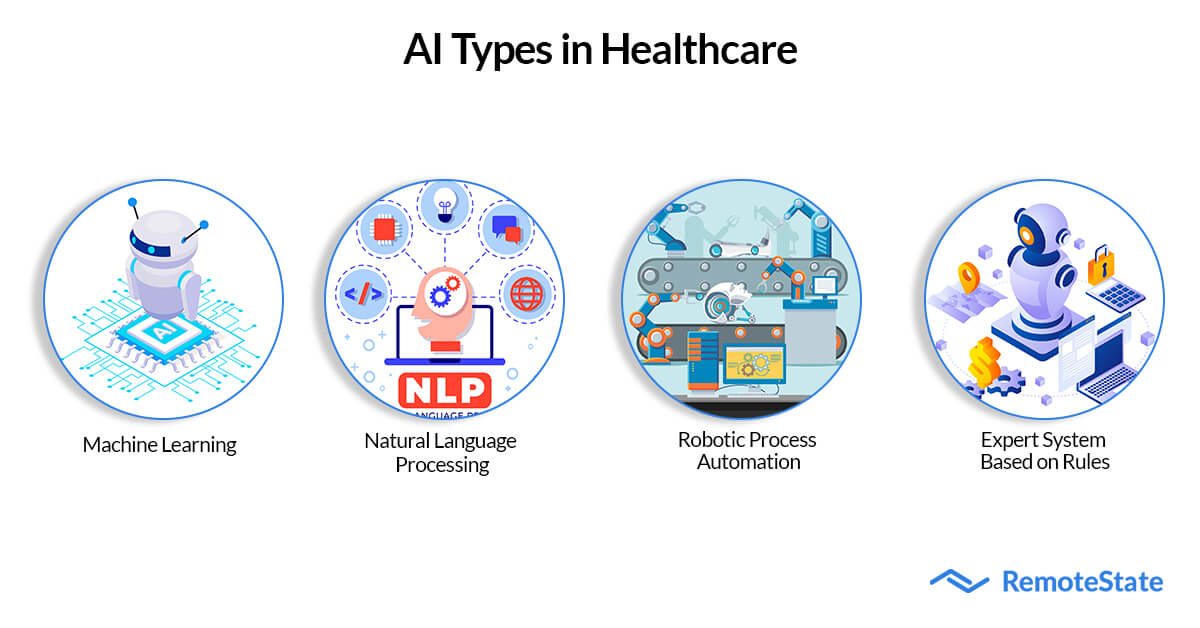
1. Machine learning
Is a type of artificial intelligence that is commonly used in hospitals and healthcare. Machine learning is concerned with the use of data and algorithms to mimic how people learn, eventually improving its accuracy. Precision medicine is the most prevalent application of ML learning in healthcare. Based on numerous patient characteristics and therapy, it forecasts which treatment techniques are likely to be effective with patients. The vast majority of precision medicine applications and machine learning require a training dataset with known outcomes. Supervised learning is the phrase for this.
Deep learning or neural network models with many levels of variables or characteristics to predict outcomes are the most complicated forms of machine learning.
2. Natural language processing
NLP applications include text analysis, speech recognition, and other language-related aims.
A common use of NLP in healthcare is the creation and classification of clinical data and published research.
Unstructured clinical notes on patients may be analyzed by NLP systems, providing great insight into refining procedures, comprehending quality, and improving patient outcomes.
3. Robotic process automation
RPA employs automation technology capable of learning, mimicking, and then executing rules-based business processes. They are less costly, easier to program, and more transparent in their activities than other types of AI. They are used in healthcare to automate repetitive operations such as updating patient information and billing.
4. Expert system based on rules
A rule-based expert system is the most basic type of artificial intelligence, employing knowledge-based rules to solve a problem. The expert system's goal is to take information from a human expert and transform it into a set of hardcoded rules that can be applied to the incoming data.
They are commonly used in healthcare for 'clinical decision support'. These rule-based systems are simple to learn and operate effectively up to a point. However, when the number of rules increases, they begin to clash and break down. However, in healthcare, they are being supplanted by more data-driven and machine-learning-based techniques.
AI's Healthcare Challenges
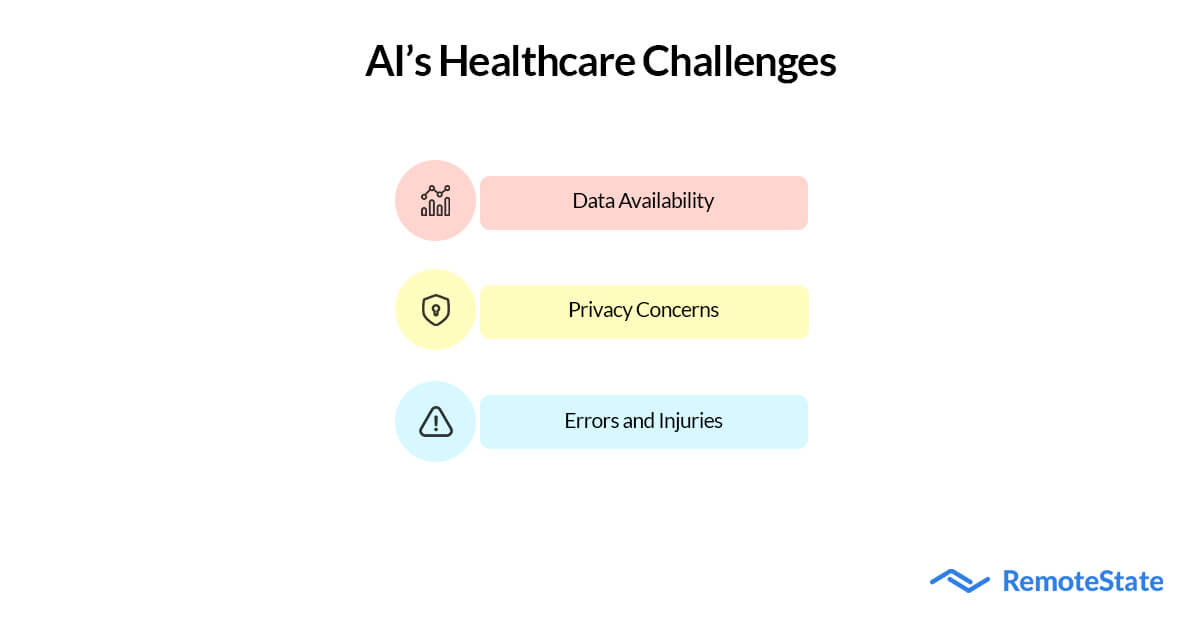
The widespread use of breakthrough technology such as AI presents a number of concerns.
A lot of hurdles exist for the healthcare business employing AI technology, ranging from a lack of quality data to security concerns.
So, without further ado, here are some of them:
-
Data availability: One of the most difficult issues with AI systems is that training them requires massive volumes of data from a variety of sources, including electronic health records, pharmaceutical records, and so on. Because the data is fragmented and individuals frequently see different health professionals, the data becomes more confusing and difficult to understand. This leads to mistakes and increased expenditures.
-
Privacy concerns: One of the major issues of AI in healthcare is the volume of data produced, which contains sensitive information and necessitates the implementation of additional security measures. As a result, it's critical to choose the correct AI software development partner that can provide a variety of security choices to guarantee your consumer data is handled properly.
-
Errors and injuries: There is a possibility that the AI system will occasionally be incorrect in recognizing possible hazards or therapy. For example, if an AI-based system recommends the wrong prescription to a patient or makes a mistake in finding a tumor in a radiology scan, the patient may be injured or suffer serious health effects.
The Future of Artificial Intelligence in Healthcare
AI is already transforming the patient experience, how physicians practice medicine, and how the pharmaceutical sector functions in healthcare. The adventure has only just begun.
AI will enable the next generation of radio instruments to be accurate and comprehensive enough to replace the requirement for tissue samples in some circumstances in the future. This might help healthcare practitioners better classify the aggressiveness of tumors and focus therapies accordingly. AI is also enabling "virtual biopsies" and propelling the cutting-edge discipline of radionics forward.
Furthermore, electronic health data may be used to identify at-risk individuals and infection trends before symptoms appear.
Using machine learning and artificial intelligence techniques to drive these analytics can result in faster, more accurate notifications for healthcare practitioners. AI can potentially give earlier warnings for illnesses like as seizures or sepsis, which frequently need intense analysis of large datasets.
Some of the main areas of research for this revolutionary strategy include using AI for risk rating, clinical decision assistance, and early alerting. AI will usher in a new age of clinical excellence and innovative advances in patient care.
How Remotestate can assist you on your AI journey
As we can see, artificial intelligence and healthcare work hand in hand due to the numerous advantages that this technology provides. Despite the obstacles, AI in healthcare can result in more accurate diagnosis and treatment regimens, as well as improved overall patient outcomes. As a result, all healthcare institutions must invest in AI technologies in order to provide clients with unique experiences and exceptional services.
Remotestate works with healthcare firms on various unique AI and ML-based models that assist improve revenue, reduce expenses and provide a better customer experience.
If you are seeking AI software development services, please contact our specialists. We can assist you in developing and implementing AI in healthcare solutions that meet your demands in the most technologically advanced way possible.
Publication Date
2023-01-30
Category
Healthcare
Author Name
Rahul Agrawal
